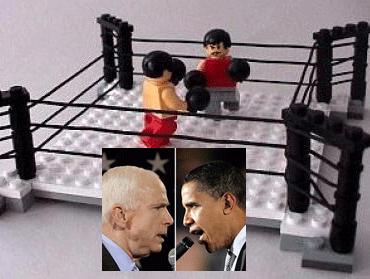
Last night Senators Obama and McCain squared off for the first debate, setting off a feeding frenzy among surrogate spinmeisters around the mediasphere. It was the Old Man and the Sea Change. So who won? Who landed the most blows? Who survived? If this had been a heavyweight bout, there would have been a decision ringside with judges who could tell real blows from low blows. The pandering of pundits only goes round and round with no “real” winner. The only way political debates ever matter is at the polls on election day. Of course, John McCain’s campaign knew ahead of time that he won. Even before McCain agreed at the last minute to honor his commitment to the independent debate commission and the American people (not to mention Ole Miss), his campaign (apparently not in suspension, just in free fall) put up an ad Friday morning on the Wall Street Journal that claimed McCain as the winner.
You could say it was a draw, although not with much blood loss. But there were a number of strategic errors and tactical mistakes. For McCain, the harbinger of war talk, it is better to look for Osama at the Gates of Hell (he left that out last night for the young folk in the audience, no doubt) than within the sights of an American fighter pilot over Pakistani air space. Bringing Bin Laden to justice is lost sight of because Pakistan is called a “failed state,” which must certainly be a shock for most Pakistanis.
But the attempt at nuance that is not likely to give McCain a surge in the polls is his dogged defense of the “surge” as a strategy in itself, attacking Obama for calling it a tactic and part of a needed wider strategy. Joe Klein in an online essay in Time was among those who saw the flaw in the rhetorical ointment:
As for McCain’s remark about Obama not knowing the difference between a tactic and a strategy—McCain was wrong. The counterinsurgency methods introduced by David Petraeus in Iraq were a tactical change, a new means to achieve Bush’s same strategic end of a stable, unified Iraq. If Bush had decided to partition the country, or to withdraw, that would have been a change in strategy.
What you do on the battlefield, if I remember my ROTC training from almost four decades ago, is tactical, especially the movement of troops. A tactical move should certainly be strategic, but strategy is how you win the war and not how you survive a battle. McCain is constantly praising the “surge” as his “mission accomplished” moment. But in public he often fails to place the surge as a military tactic within its overall strategic framework. It will take more than extra troops to win the ongoing war in a destroyed Iraq.
The surge in troops does not guarantee victory in a civil war where occupation is not part of the long term strategy. In Iraq the troop surge was combined with two major diplomatic efforts. First, the United States established Sunni Awaking Councils, buying the loyalty of Iraqi tribesmen so that they would no longer give safe haven to Al-Qaeda fighters. Although a number of these tribal sheikhs have been killed, this is the kind of move that brings down American casualties. A second main part of the strategy has been a ceasefire, shaky (if not so sheikhly) but still holding for the most part, with the Iran-backed Mahdi Army of Al-Sadr. The point of this major shift in strategy has been to buy time for Iraq’s government to get in control. The fact is that the government exists mainly in the relatively safe haven of the Green Zone, is still not willing to spend its own oil revenues for its defense, and has hardly gained the respect of the Iraqi people as a whole.
McCain, however, consistently misses the point. The unnecessary and unproductive war in Iraq was a strategic blunder by the current Republican administration, a blunder that McCain fully supported from the start. The political tactic McCain uses time and time again in claiming only he knows how to win a war does not jive with the major lack of strategic vision in dealing with the kinds of threats like 9/11. So let McCain march to the gates of hell and call out Bin Laden. If he fails to find him there, he can always take refuge in Alaska and share a cave with James Dobson after the rest of the nation feels the biblical-proportioned wrath of God’s judgment.
Luke R. E. Publican